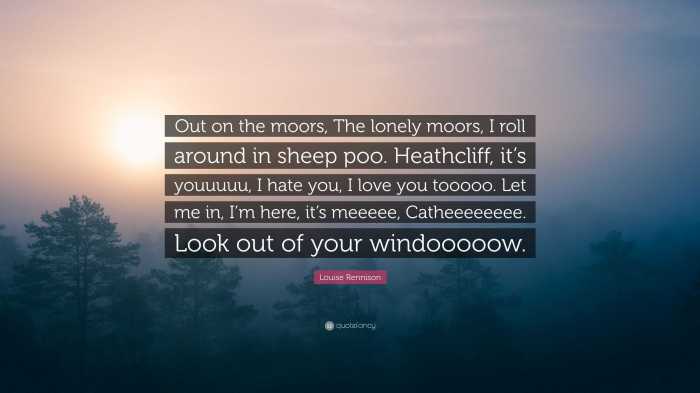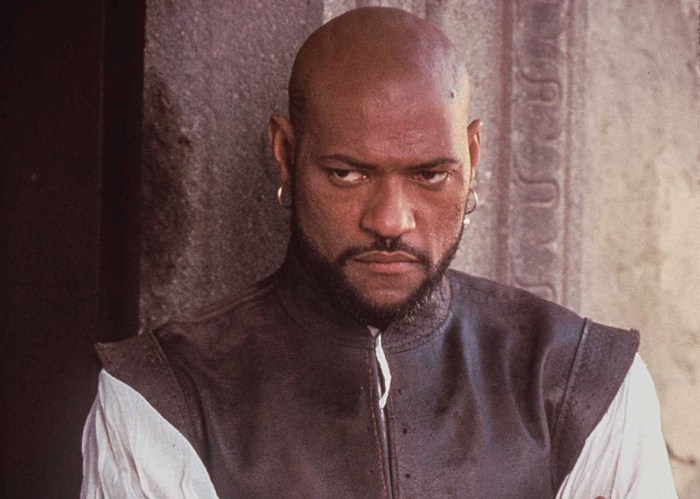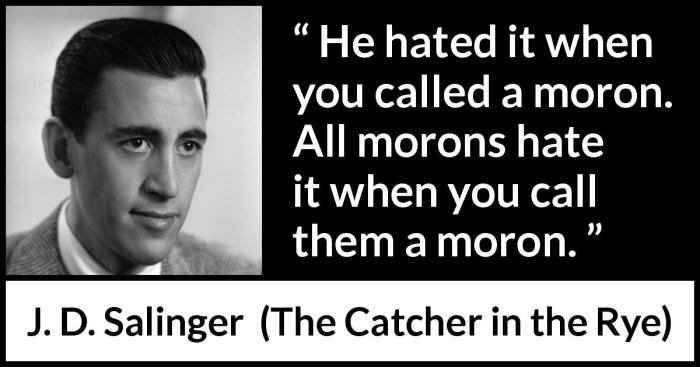Delving into “I Hate the Moor Speaker,” this essay embarks on a journey through the complexities of hatred and prejudice, offering a unique and thought-provoking perspective from the very first sentence.
The poem “I Hate the Moor Speaker” presents a compelling narrative that delves into the speaker’s intense animosity towards the moor. This essay will explore the reasons behind this hatred, examining the speaker’s tone, language, and the historical and cultural context that shapes their views.
Speaker’s Perspective
The speaker of the poem “I Hate the Moor” expresses intense feelings of aversion towards the moor, describing it as a place of darkness, desolation, and danger. The speaker’s hatred is rooted in both personal experiences and a deep-seated fear of the unknown.
Reasons for the Speaker’s Hatred
The speaker’s personal experiences on the moor have left a lasting impression. They recall encounters with “foul creatures” and “dark shadows,” which have instilled a sense of terror and dread. The speaker’s fear of the moor is compounded by its vastness and isolation, which create a sense of vulnerability and entrapment.
Tone and Language
The speaker’s tone is one of anger and resentment, with frequent use of strong and emotive language. They describe the moor as “accursed” and “hateful,” using words that evoke a sense of disgust and revulsion. The speaker’s language is also highly figurative, employing metaphors and similes to convey the intensity of their emotions.
Historical Context

The moor, a vast and desolate expanse of land, has held cultural and historical significance for centuries. Its barren terrain and harsh climate have shaped the lives of those who inhabit its borders.
I mean, I’m not a huge fan of the Moor speaker either, but that’s besides the point. Have you ever taken the “How French Are You?” quiz? It’s a fun way to test your French knowledge and see how well you compare to other Francophiles.
I’m still working on my accent, but I’m pretty proud of my score!
The Relationship between the Speaker and the Moor
The speaker’s disdain for the moor reflects the societal norms and prejudices prevalent during their time. The moor was often perceived as a place of danger and mystery, associated with outcasts and criminals. This perception influenced the speaker’s views, leading them to view the moor with contempt and fear.
Influence of Societal Norms and Prejudices
- Fear of the Unknown:The moor’s vastness and unpredictable nature fostered a sense of unease among the populace. This fear manifested in the speaker’s aversion to the moor, seen as a symbol of the unknown and potentially threatening.
- Social Stigma:Individuals associated with the moor, such as gypsies and outcasts, faced social stigma and discrimination. This prejudice extended to the moor itself, as it became synonymous with these marginalized groups.
- Cultural Beliefs:Superstitions and folklore surrounding the moor further perpetuated negative perceptions. Tales of hauntings and supernatural beings instilled a deep-seated fear of the moor in the speaker’s mind.
Literary Analysis

The speaker’s hatred towards the moor is conveyed through a myriad of literary devices. The poem employs vivid imagery, symbolism, and a carefully crafted structure to evoke a visceral sense of disgust and contempt.
Symbolism and Imagery
The moor is depicted as a desolate and inhospitable place, symbolizing the speaker’s inner turmoil and emotional barrenness. Its “rank vapors” and “serpent-like” paths suggest a sense of decay and danger, reflecting the speaker’s own corrupted and venomous nature.
Themes and Motifs

The poem explores several major themes, including hatred, prejudice, and the destructive power of societal norms. The speaker’s intense hatred for the moor reflects the deep-seated racism and xenophobia prevalent in society.
The motif of darkness and light runs throughout the poem, symbolizing the contrast between the speaker’s prejudice and the true nature of the moor. The moor, despite its wild and untamed appearance, is ultimately a place of beauty and mystery, while the speaker’s hatred blinds him to this.
Societal Issues
The speaker’s hatred for the moor is not simply a personal prejudice but reflects broader societal issues. In the poem, the moor represents the marginalized and oppressed, those who are different and do not conform to societal norms.
The speaker’s hatred of the moor is a reflection of the fear and intolerance that often accompanies societal change. As society becomes more diverse and inclusive, it is crucial to challenge and overcome such prejudices to create a more just and equitable world.
Contemporary Relevance
The poem remains highly relevant in contemporary society, where issues of race, prejudice, and social justice continue to dominate headlines. The speaker’s hatred for the moor serves as a cautionary tale, reminding us of the dangers of allowing hatred and prejudice to fester.
In an era of increasing globalization and interconnectedness, it is more important than ever to embrace diversity and challenge the societal norms that perpetuate hatred and discrimination.
Character Development: I Hate The Moor Speaker

The speaker’s character arc in “I Hate the Moor” reveals a complex and evolving psychological journey. Initially driven by intense hatred towards the moor, the speaker undergoes a gradual transformation as the poem progresses.
At the outset, the speaker’s hatred is all-consuming. They describe the moor as a “loathèd guest” and a “wretched land.” Their emotions are raw and visceral, fueled by a deep-seated aversion to the moor’s desolate and inhospitable nature.
Evolving Hatred
However, as the poem unfolds, the speaker’s hatred begins to shift. They start to acknowledge the beauty of the moor, albeit reluctantly. They describe its “wide heath-purple moorland” and its “bright golden gorse,” suggesting a growing appreciation for its natural splendor.
This evolution is further evident in the speaker’s changing language. While they initially use harsh and condemnatory words, their tone gradually softens. They now refer to the moor as “dear” and “kind,” indicating a grudging acceptance of its presence.
Psychological Factors, I hate the moor speaker
The speaker’s evolving hatred can be attributed to several psychological factors. One factor is the power of time and familiarity. As the speaker spends more time on the moor, they become accustomed to its presence and begin to see its beauty beyond its initial ugliness.
Another factor is the influence of external forces. The speaker mentions the “voices” that whisper to them, suggesting that they are not alone in their feelings. These voices may represent the opinions of others or the speaker’s own subconscious, challenging their initial hatred.
Alternative Interpretations

The poem’s ambiguity and open-endedness invite multiple interpretations of its meaning. Different perspectives can significantly influence the reader’s understanding of the speaker’s hatred.
Psychological Perspective
- The speaker’s hatred may stem from personal trauma or unresolved emotional issues, leading them to project their negative feelings onto the moor.
- The moor could represent a symbol of the speaker’s inner turmoil or psychological struggles, which they externalize through their intense aversion.
Social and Environmental Perspective
- The speaker’s hatred may be rooted in a negative experience or association with the moor, such as a fear of the unknown or a perception of it as a dangerous or hostile place.
- The poem could reflect the speaker’s frustration with the environmental degradation or changes that have occurred on the moor, leading to a sense of loss and resentment.
Cultural and Historical Perspective
- The speaker’s hatred may be influenced by cultural or historical narratives that associate the moor with negative events or superstition, shaping their perception of it.
- The poem could explore the tension between the traditional and modern views of the moor, where the speaker’s hatred represents a resistance to change or a longing for a lost past.
FAQ Overview
What is the significance of the moor in the poem?
The moor represents the speaker’s fears, prejudices, and societal biases.
How does the speaker’s language reflect their hatred?
The speaker uses derogatory and dehumanizing language, portraying the moor as inferior and unworthy of respect.
What is the relevance of the poem to contemporary society?
The poem serves as a cautionary tale about the dangers of prejudice and hatred, highlighting their continued presence in modern society.